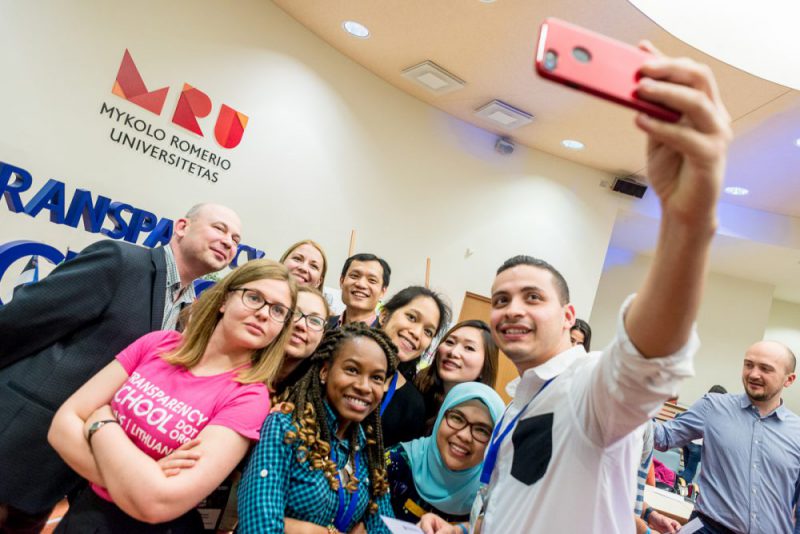Transparency School
Savaitės trukmės paskaitų, seminarų bei praktinių užsiėmimų ciklas būsimiems skaidrumo lyderiams. Jos metu analizuojama korupcija įvairiuose sektoriuose bei srityse, korupcijos priežastys ir pasekmės, skaidrumas bei kitos su korupcija susijusios temos.

Kas naujo?
Daugiau apie Transparency School
We can help you understand:
- How to properly account for your actions to the public.
- How to prepare accountability and openness standards.
- How to manage corruption risks.
- How to include citizens into decision-making.
- What to do with reports of possible violations.
- How to manage conflicts of interest.
- How to account for used public finance.
- How to properly prepare and effectively implement codes of ethics/conduct.
“Breakfast of Journalists” – is an initiative we started in 2009 with the aim of familiarising Lithuanian journalists and journalism students with best journalism practices abroad and to encourage journalist community discussions about professional ethics, transparency, and accountability. In total we have organised more than 30 seminars so far.
Breakfast of Journalists events were moderated by such distinguished foreign journalists as Aidan White (previously – manager of International Federation of Journalists), Diane Kemp (BBC, University of Birmingham), Gavin MacFadyen (Centre of Investigative Journalism, UK), Graham Barrow (The Dark Money Files), Henrik Kaufholz (Politiken, Denmark), Simon Bowers and Lionel Faull (Finance Uncovered), Stephanie Hegarty (BBC), Toby Murcott (BBC).
Since 2021 “Breakfast of Journalists” have been organised in partnership with the Lithuanian Journalism Centre.
Since 2007 we have been actively working with media transparency. We presented two studies: an investigative Lithuanian, Latvian, and Swedish media study (2009, in Lithuanian), and a qualitative interview (in Lithuanian) with businesspersons’ results (they were asked about their experience working with the media and their opinions of it, 2007). We organise “Breakfast of Journalists” initiative, and in 2013 we started a media ownership site STIRNA.INFO.
We can help you understand:
- Where and how to implement codes of ethics/conduct, prepare their implementation outlines.
- What the main risks of corruption are and how to manage them.
- How to properly provide information to the public on your activities and implement accountability standards.
- What to do with reports of possible violations.
- How to manage conflicts of interest.
Public procurement makes up a large part of European Union (EU) country public spending: at least 14 percent of annual EU GDP (approx. 2 trillion Euros), and in Lithuania: about 12 percent of the country’s GDP.
Public procurement, in terms of anti-corruption, is one of the most high-risk areas. Based on expert calculations, corruption in EU public procurement costs about 5 billion Euros annually.
Since 2006 we have been conducting various studies, analyses, and reviews in order to bring more transparency around public procurement. The Republic of Lithuania 2006-2010 undisclosed procurement practice analysis conducted in 2011 has shown that during the analysed timeframe, undisclosed public procurement contracts made up 29,5% of all public procurement contract value.
A survey of businesspeople conducted in 2017 in Kaunas and Vilnius showed that almost one in three (31%) businesspeople in Vilnius and nearly one in five (19%) in Kaunas did not participate in public procurement because, in their opinion, the tender was intended for a specific company. They also admit that most suppliers would take advantage of having acquaintances with the aim of winning the tender.
In 2020, during the first year of the COVID-19 pandemic, we participated in an Open Contracting Partnership COVID-19 Action Research Program together with 12 other teams from around the world. The objective of this study was to generate recommendations to improve efficiency, effectiveness, fairness, integrity, and equity of public contracting.
Since 2006 we have been actively working with public finance transparency by analysing how transparently public and EU funds, including the EU ones, are allocated and used. We have also released several printed publications regarding this topic, which you can find in the TI Lithuania library.
In 2006 (in Lithuanian) we conducted research on how transparent the allocation of the European Union structural funds in Lithuania is. In 2018 we conducted State investment programme (SIP) analysis in order to investigate how transparently and responsibly this investment programme is implemented, to which Lithuania annually allocates 1.3 billion Euros. SIP was started in 1997 when it was decided to purposefully invest into strategic infrastructure projects.
In 2020 we also joined the “Open Spending EU Coalition”, the goal of which is to promote transparent, open, and effective use of public funds. The most recent evaluation has shown that Lithuania was amongst the best countries in EU for publishing information about economic recovery and resilience facility (RRF) fund allocation – receiving 76 out of 100 points and was third amongst 11 countries.
- “What are the global standards of accountable journalism?”, 2022 (in Lithuanian).
- “Breakfast of Journalists” in Visaginas, 2022. Recording. (in Lithuanian)..
- “Marking of sponsored content: when does news become an advertisement?”, 2021. Recording (in Lithuanian).
- “How to create an audience online? Expansion strategies for regional media”, 2021. Recording (in Lithuanian).
- Disinformation and migrant crisis in 2021: how to recognise disinformation and misleading information?”, 2021. Recording (in Lithuanian).
- “Journalists’ right to receive and publish information and personal privacy assurance in accordance with GDPR: is a balance possible?”, 2021. Recording (in Lithuanian).
- “Breakfast of Journalists” seminar, 2021. Recording (in Lithuanian).
- “Covering migration: insights from the perspective of public interest journalism”, 2021. Recording.
- “Breakfast of Journalists” in Klaipeda, 2021. Recording (in Lithuanian).
- “Breakfast of Journalists” is back! Intense seminar with “Finance Uncovered”, 2021 (in Lithuanian).
- “How to investigate money laundering instances?”, 2019 (in Lithuanian).
Otas
Our interactive transparency search system. Search for information about persons of interest, institutions, legislative acts, etc.



